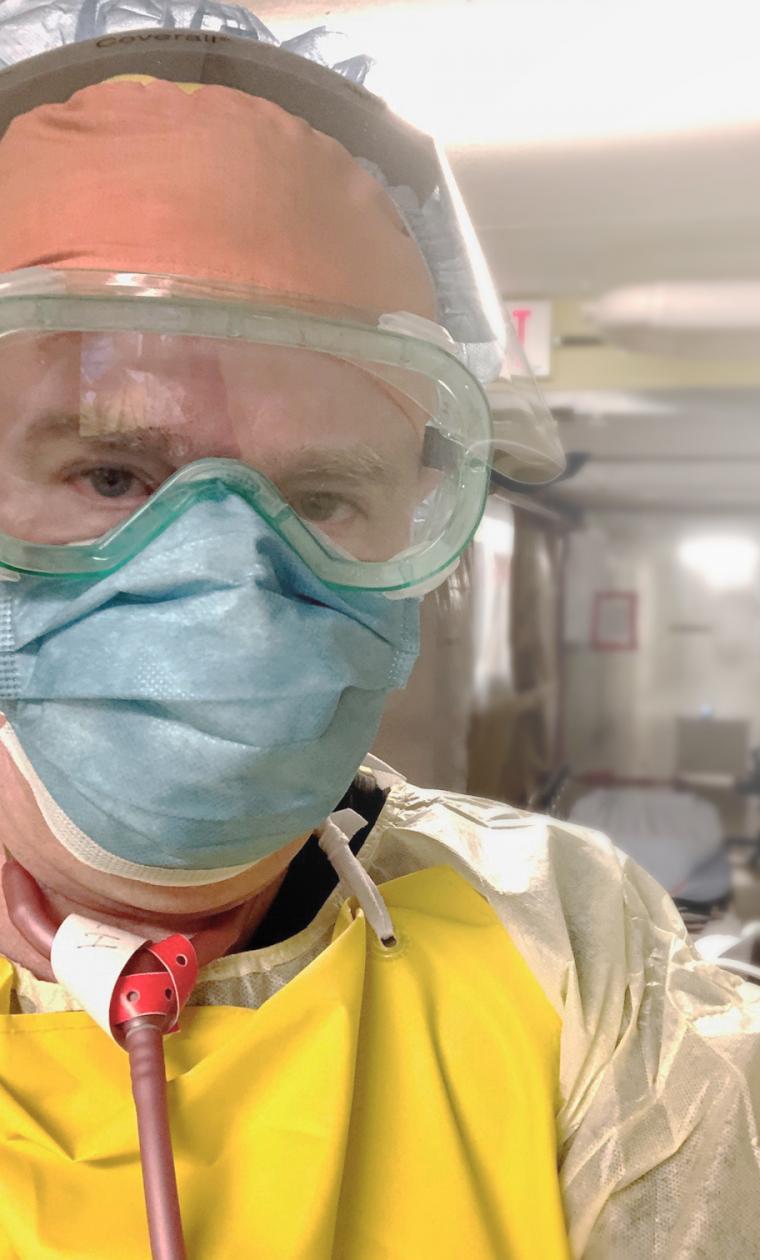A dedicated family physician practicing in Fort St. James, Dr Anthon Meyer started as co-chair of the General Practice Services Committee (GPSC) in June 2020. The Doctors Making a Difference team sat down with Dr Meyer and talked with him about his leadership style, what the GPSC is doing to support family doctors during this pandemic, and his views on what the future holds. What follows is a condensed version of that conversation.
What drew you to the role of GPSC co-chair?
I am aware of the struggles and daily challenges that add to the burden of family physicians – I face them too. There are too many unattached patients. With chronic disease increasing, so does the complexity of our work. There is more paperwork. All this makes our work challenging and can lead to burnout.
I see the role of co-chair as an opportunity to recognize and advocate for family physicians to be valued at all levels in providing care to patients. Many people do not realize this, but the GPSC, which is the leading collaborative table for primary care in BC, is an important space where advocacy takes place with the goal of problem-solving and getting to solutions.
What is your approach to leadership?
I’m here to serve, I’m here to listen and to understand better. I follow the course of transparency and integrity as a key driver of successful leadership. I believe in inclusion, in diversity, in being kind, mindful, aware, and comfortable to lose hierarchy. I’m not afraid to fail. I’ve failed many times in my life and some of my biggest strengths come from the failures that I’ve experienced. I believe strongly in creating safe spaces for meaningful and humble dialogue, but this should never be misconstrued for weakness.
Family doctors are facing significant challenges in their practices that have been amplified during this pandemic. How is the GPSC working to address these concerns?

The pandemic has brought unprecedented challenges to our profession. The struggle and worries of family doctors are very real. The GPSC is very much making a difference for family doctors, our patients, and primary care. The challenge is that people are often not aware of this, because in a partnership, so much of the advocacy happens through frank and honest discussions back and forth between partners at the collaborative table. Most often we are able to achieve consensus and announce programs and initiatives to support you. But you don’t hear about the advocacy work that your physician representatives are doing behind the scenes to ensure your concerns are heard and understood, and that your issues are addressed. That is the nature of collaboration.
Can you give an example?
One example of this is the Ministry’s recent commitment that community doctors will get PPE (personal protective equipment) through the provincial supply chain, at no cost. The decision rests with the Ministry, but the GPSC played an important role to get to this outcome. The same applies to the new funds for pandemic planning for doctors working with divisions and MSAs (Medical Staff Associations). The foundation for this progress lies in the long-term relationship between the partners, the ability for everyone to be frank about our issues and our positions, but always with a collective commitment to find solutions. That is just one example, there are many others.
Family medicine will be very different after this pandemic is over. How will the GPSC play a leadership role in helping to ensure doctors can provide the very best quality care in a changed environment?
The pandemic has shown how resilient and nimble we can be in adapting health care delivery. We now have an opportunity to take what we’ve learned and apply that to the future. For example, with the other Joint Collaborative Committees and with Doctors of BC, we are exploring things like virtually-enabled, team-based care as part of strong foundations for patient medical homes in support of successful primary care networks. Ultimately, the pandemic brought challenges, but it also brought huge opportunities.
You often say that longitudinal care for patients is a key foundation for primary care. Why is it important?
We know there is value in longitudinal comprehensive practice. Family physicians provide these services as experts in primary care where they work in the clinic, admit to hospital, do acute care, emergency, inpatient care, long-term care, maternity, and delivery. It is that comprehensive lens that we need to incentivize and support. Longitudinal care and breaking down barriers to access are foundational to a well-functioning health care system.
Divisions of family practice play a huge role in primary care in BC. How does the GPSC support divisions?
I am inspired by work being done by our 35 divisions of family practice.
An important part of the work of GPSC is to support divisions with their partnerships on the ground. They are the ones facing challenges on the front lines. They are the champions of the best in us. They drive positive primary care change at the local, grassroots level. For me, they are the heroes, because they are embracing change in a manner that is showing all of us what it takes to be mindful within the social construct of shared governance and accountability between health authorities and divisions of family practice. I am keen to listen to and understand more what our divisions need from the GPSC to help all of us improve patient and provider experience, save costs, and improve outcomes.
Do you get frustrated sometimes, and how do you cope with that?
Everyone gets frustrated sometimes. The reality is that, in a collaborative setting, we may not always get everything we want – that is the nature of both collaboration and negotiation, but we do a lot of good things for doctors, our patients, and the health care system. Can we do better? Absolutely, always. I am committed to continuing on this road in a positive, hopeful way. I will always stand up and be passionate about our profession.
When your term as GPSC co-chair ends, can you tell us one thing you will be most proud of achieving?
I hope that I will have played a role in helping to bring joy back to comprehensive longitudinal family practice.
What brings you joy at a professional and personal level?
On a professional level, the biggest joy I get is the opportunity to make the patient a partner in their management plan, to make the community a partner in their health service delivery that they want us to provide to them, to bring that awareness to family doctors and understand the value of that. When not working, I love spending time with my family, which now includes two grandchildren, aged two and four. “I have been very blessed.” I also enjoy travel, reading, and staying fit through running and on the rare occasion when time permits, golf.

